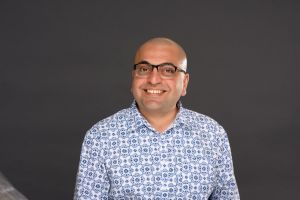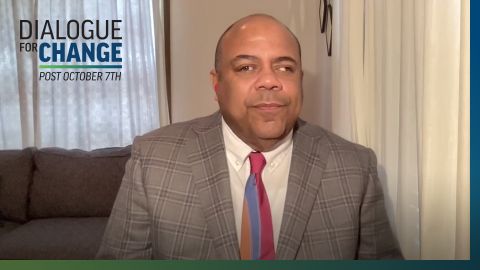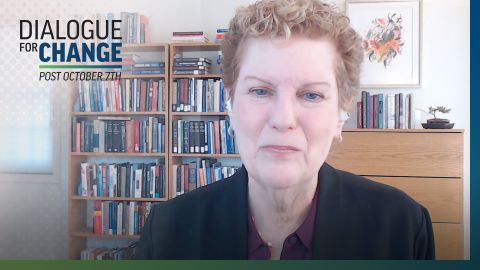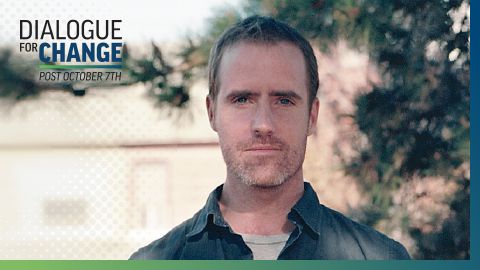AHMED FOUAD ALKHATIB I have a lot of grief. I have a lot of trauma. I feel horrible about what’s happening. I’m horrified. I’m angry. I’m upset. But I’m not hateful. And I’m channeling those energies into something constructive, like building bridges, Like advocating for peace.
HARI SREENIVASAN Ahmed Fouad al-Khatib was born in Gaza City. He moved to the US to study in 2005, and was granted asylum after Hamas took power in 2007. Today a writer and Middle East analyst. Ahmed has a large extended family living in the Gaza Strip since the war began. More than 30 of his family members there have been killed. In his grief, Ahmed has been speaking out about many things, including the need to find a new path forward. Its work has been published in numerous publications, including Newsweek and The Atlantic. We spoke to Ahmed in February. Ahmed Fouad Alkhatib, thanks so much for joining us.
AHMED FOUAD ALKHATIB Thanks for having me.
HARI SREENIVASAN Ahmed. So we’re having these conversations post October 7th. And if I identify you as a Gazan automatically, members of our audience, oh, I know what this guy is going to say. What is something that they might not think that you would say?
AHMED FOUAD ALKHATIB They might not think that Gazans are people like you and I, who want to live in peace, who want to co-exist with their Israeli and Jewish neighbors, and who are often held hostage by circumstances over which they have no control.
HARI SREENIVASAN So explain how Americans might misinterpret that somebody who is from Gaza, who has family in Gaza can be pro-Palestinian, but not necessarily pro- Hamas.
AHMED FOUAD ALKHATIB Well, that’s one of the biggest challenges. Unfortunately, since October 7th, there is a misconception that Hamas is there strictly because Gazans chose them and voted for them and want them to be to want them to be the governing body in charge of their affairs. Hamas won elections, parliamentary elections in 2006. That’s well, almost 20 years ago. There’s not been any elections since. And so Hamas is not there as a result of public will. Now, of course, Hamas is popular in a variety of ways, both because it has propagated the resistance narrative that seeks to equate it with any effort to push back on Israeli injustices. However, Hamas is not universally liked by Palestinians in Gaza, and we have to keep in mind that when Hamas won the elections, Gaza’s population was 1.4 million. Now it’s approximately 2.3, meaning that half of Gaza’s population wasn’t around when Hamas was voted in. So I have been desperately trying to get people to build consensus on meaningful steps that will end the injustices faced by the Palestinians without the use of violence, without the exclusionary. Ideology of Hamas, and without this fallacy that Hamas is an organic expression of resistance when it’s not. Hamas is a nefarious political group that has very narrow political objectives, and it uses its people to achieve those objectives.
HARI SREENIVASAN Does your critique of Hamas rob members of your family or other friends in Gaza the wrong way?
AHMED FOUAD ALKHATIB There are people in Gaza that have been sort of trying to get me to slow down on my criticism, not because they like Hamas or they support the group, but they have genuine fears and concerns about their own well-being. Even Palestinians and folks that I know in the Western world face a difficult time trying to push back on Hamas, because unfortunately, there is this forced conformity whereby we’re supposed to only keep the focus on Israel and only criticize Israel and not engage in self-critique or self-reflection or introspection as to the mistakes that his historic and contemporary that were made by Palestinian leaders, by those who proclaim to represent the interests of Gazans. And so, unfortunately, a lot of people are just reluctant to speak out.
HARI SREENIVASAN Take me back a little bit to October 7th. What what motivated you to start writing and start speaking out? And now what keeps you going?
AHMED FOUAD ALKHATIB I knew that Gaza as we knew it would cease to exist. I knew for a fact that I would lose a significant amount of my family members. I just I registered the sheer magnitude of this. I mean, after all, you’re talking about the worst single day for, for, for for Judaism and Jews since the Holocaust. So I knew that the consequences would be a disaster of epic proportions. I also knew that if there wasn’t a legitimate voice. From Gaza like my having family there, having come from Gaza, if a voice like mine doesn’t come forward, then the maybe the rest of the world will think of all of Gazans as being pro- Hamas and pro-terror and pro-violence. And I wanted to counter that. I also wanted to counter the normalization of Hamas. And I wanted to counter that. I also wanted to counter the normalization of violence, the celebration of October 7th, which I thought and still think is one of the most tragic events that could have ever been associated with the Palestinian national project.
HARI SREENIVASAN What do we in the West get wrong when we are looking at this conflict with the media that we consume?
AHMED FOUAD ALKHATIB Unfortunately, there is this reductionist approach due to, you know, soundbites and and limited media presence in Gaza to actually convey the sentiments of the people. So there’s so much color and complexity and nuance that unfortunately, is not conveyed in the Western press. And because of the very kind of binary nature of this conflict. You’re either pro-Israel or you’re pro-Hamas. You know, you’re pro this or you’re pro that. It’s very binary. They’re very entrenched narratives with very little that comes across as a barrier, if you will. My goal is to introduce a lot of color and a lot of nuance. On the pro-Palestine side. And a lot of activists and a lot of people are not aware of that history, or they’re not aware of Hamas’s background and Hamas’s practices in Gaza. They, too, gravitate towards simplistic narratives and simplistic slogans that fundamentally miss the big picture. And so that’s what I’m trying to do, is I’m trying to humanize the Palestinian people in Gaza. I’m trying to humanize the plight of civilians who are being held hostage by circumstances over which they have no control. I’m trying to build bridges with the pro-Israel camp. I’m trying to show that even with Zionists who are, you know, diehard pro-Israel like that, there’s the slightest of common ground that we can build and establish to move the needle forward, to move the issue forward, to, to forge a different path forward, because neither people are going anywhere. And what we’re doing right now on college campuses and in the streets might feel good. It might feel like you’re you’re you’re promoting the Israel narrative or you’re promoting the pro-Palestine narrative, but ultimately all you’re doing is further inflaming a highly dysfunctional discourse.
HARI SREENIVASAN What do you think has changed after October 7th, especially on these college campuses? Did Hamas calculate this, knowing that images like the ones that we are seeing on TV over and over again would erode support for Israel, would make people look at this through an oppressor and victim lens?
AHMED FOUAD ALKHATIB Unfortunately, and a lot of people don’t like me saying this, but this is absolutely part of Hamas’s strategy. I mean, Hamas counts as part of its program that an overwhelming and a destructive Israeli response will force Israel to pause its operation and essentially delegitimize Israel in the eyes of the world. And and to an extent, Israel plays right into that trap, if you will. I mean whether it be Israel or any other nation. I think when October 7th happened, it was inevitable that there would have been a response, like, what did Hamas think? That Israel would somehow not seek to destroy its infrastructure and base in Gaza. Hamas knew that this would happen. It counted on dead Gazans. Dead children, dead women destroyed infrastructure, horrendous scenes of bombardment overwhelming Israeli firepower turning global audiences against Israel. Now it’s just I genuinely think not only is that immoral and awful, but I think that’s a terrible political strategy. That’s a terrible program to move Palestinian rights forward.
HARI SREENIVASAN Among the pieces that you’ve written, you wrote one called Hamas is “Western apologists have become Hamas enthusiasts as a Gazan I’m horrified.” In the piece, you called them out for disguising themselves as pro-Palestine activists. What do you mean by that?
AHMED FOUAD ALKHATIB Well, after October 7th, a lot of folks who historically would tell you, well, I don’t support Hamas, but the occupation or. Well, I don’t like Hamas’s choices. But the Israeli blockade, I think, shamefully, have upgraded to full enthusiast of Hamas because they I think part of it was they were mesmerized by by the scenery from October 7th. And they thought that Hamas’s attack was this brilliant marvel of resistance. I think that initially just blew a lot of people away and kind of turned something in their head that maybe armed resistance is the only path forward. Of course, that conveniently overlooks the fact that horrendous massacres of Israeli civilians, women and children took place. And that’s not to say all of the pro-Palestine movement. Far from it. There’s that’s a segment of it, if you will. A lot of people are genuinely horrified by what’s happening, but there’s this misplaced compassion that got turned into overt pro violence and pro Hamas sentiments. And I think that undermines the Palestinian cause. I think it misrepresents what is what Hamas is doing, Hamas’s calculus. And I think it harms pro-Palestine advocacy.
HARI SREENIVASAN Ahmed, I wonder when someone sees your point of view on a social media platform, do you get called out for, you know, whatever being a sellout or a spy for Israel or, you know.
AHMED FOUAD ALKHATIB An apologist all the time, all the time. The challenge isn’t just that it’s done by random trolls on. Twitter, where it genuinely surprises me and kind of just exacerbates the situation and makes this discourse more toxic, is when it’s done by supposedly intellectuals and academics and PhDs, and otherwise, you would think, intelligent people who could at least engage with what I’m saying. And instead, unfortunately, a lot of people do resort to attempts to delegitimize me because I threaten the very narratives that they have propagated for years. And when a Palestinian with skin in the game, with someone who’s lost dozens of family members, when someone who lived in Gaza is saying something that is actually challenging the entrenched narratives, is pushing for peace as the only viable path forward, a lot of people are either puzzled or this threatens their fiefdoms and their their whole narrative, their whole world upon which their activism is built.
HARI SREENIVASAN How many family members have you lost now?
AHMED FOUAD ALKHATIB I’ve lost cumulatively, 31 family members in three different strikes in the Gaza Strip. Two in Gaza and one massive one in Rafah on December 14th whereby 28, family members of mine, on my mom’s side were killed. Certainly some of that is, Hamas. I absolutely think some of that is on Hamas in terms of how they’re fighting this war, how they’re embedding themselves amongst the population. And I don’t say that to justify the Israeli atrocities that are being committed against us. I am absolutely critical of the Israeli government. I am absolutely critical of the injustice, the historic injustices that the expression of Zionism has entailed for the Palestinian people. But I, I am very robustly focused. on the Palestinian side, because that’s where I see the true potential for changes. If we acknowledge our role and our our our agency, our our ability to influence our fate, to make choices, to take action even though we’re under occupation, even though we’ve experienced injustice, if we think differently and approach this differently and courageously take steps that could alter our our fate and our trajectory, I genuinely believe that will yield the most transformative results.
HARI SREENIVASAN Have you been surprised by the spike in antisemitism post October 7th?
AHMED FOUAD ALKHATIB I think unfortunately, well, some of it is surprising. Some of it is a product of the sheer suffering that is happening in Gaza and the carnage and the amount of death and destruction. And I’m certainly far from justifying it. I’m simply stating that people are upset and are angry. And they have a lot of passionate feelings about about the horrors and the deaths of almost 30,000 Palestinians, that half of whom are children. And so there is this desperation to kind of do something, if you will, and to speak out. And unfortunately, I think there are a lot of misdirected energies that are not being harnessed. to do good. They’re not being harnessed to build something constructive.
HARI SREENIVASAN What do you think the best way to help Palestinians is? I mean, what is the, you know, role that outside of the Middle East, the pro-Palestinian movement can do to help Palestinians who are actually there?
AHMED FOUAD ALKHATIB Well, number one is, I think, actually focus on practical, pragmatic solutions. That’s why I’m calling for airdrops, to try to drop food into northern Gaza. Actually care about improving the life living standards and the lives of the Palestinians. Think about humanitarian solutions. Think about pragmatic solutions that account for the inevitability of peace and coexistence. The Jews aren’t going anywhere. The Israelis aren’t going anywhere. The Palestinians aren’t either. I may be one of the few voices that are pushing the boundaries and pushing the limits, but I know for a fact, having lived in Palestine, having talked to Palestinians, talking to my family, talking to the diaspora community, that those sentiments are absolutely held by many others. Speaking for myself, every day, every hour is a struggle. I have a lot of intense feeling. I have a lot of grief. I have a lot of trauma. I feel horrible about what’s happening. I’m horrified. I’m angry. I’m upset. But I’m not hateful. And I’m channeling those energies into something constructive, like building bridges. Like advocating for peace.
HARI SREENIVASAN Ahmed, for al-Khatib, thank you so much for joining us.
AHMED FOUAD ALKHATIB Thank you so much for having me. I appreciate it.
 Ahmed Fouad Alkhatib came to the U.S. from Gaza in 2005 as a teenage exchange student. Today he writes extensively on Gaza’s political and humanitarian affairs and believes that coexistence and peace is the only path forward between Palestinians and Israelis. Alkhatib has a Bachelor’s degree in business administration and a Master’s in intelligence and national security studies. His writing has been published in U.S. and Israeli outlets and his opinions and comments have been featured in international press.”
Ahmed Fouad Alkhatib came to the U.S. from Gaza in 2005 as a teenage exchange student. Today he writes extensively on Gaza’s political and humanitarian affairs and believes that coexistence and peace is the only path forward between Palestinians and Israelis. Alkhatib has a Bachelor’s degree in business administration and a Master’s in intelligence and national security studies. His writing has been published in U.S. and Israeli outlets and his opinions and comments have been featured in international press.”


